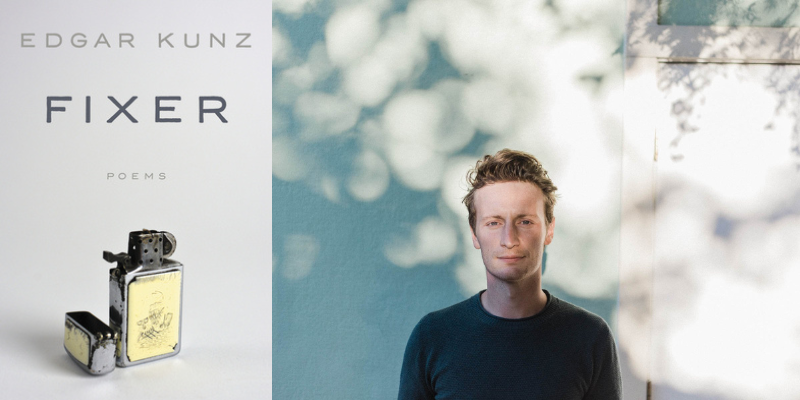
Edgar Kunz on Knowing When a Poem is Finished
In Conversation with Mitzi Rapkin on the First Draft Podcast
First Draft: A Dialogue of Writing is a weekly show featuring in-depth interviews with fiction, nonfiction, essay writers, and poets, highlighting the voices of writers as they discuss their work, their craft, and the literary arts. Hosted by Mitzi Rapkin, First Draft celebrates creative writing and the individuals who are dedicated to bringing their carefully chosen words to print as well as the impact writers have on the world we live in.
In this episode, Mitzi talks to Edgar Kunz about his new poetry collection, Fixer.
Subscribe and download the episode, wherever you get your podcasts!
From the episode:
Mitzi Rapkin: How do you know when you’ve finished a poem?
Edgar Kunz: Showing the poems to other people helps, you know, because they can reflect back to you what they see happening in the poem and if they think the poem is fulfilled, right, if it’s achieved what it set out to do. But you also want to make sure that the poem is ambitious enough, like if the poem is just setting out to do something simple, and it achieves that thing, well, you know, fine, but you’ve got to make sure that the point is pushing past even the first, second, third thing that you might think the poem is doing, and then to some more difficult and nuanced place, a truer place, you know, ultimately. So how do I know when it’s finished? When I read it, and I don’t hate it. When I read it, and I’m not like, Oh, that’s so corny or I think that’s over simple, or it’s too easy or the elements of the metaphor, you know, the submerged content, and the surface level content are too close, they’re too close together, it’s too obvious of a comparison to be making, then I try to increase that distance, vastly, you know, I try to make the metaphor more surprising and more alive or I try to insist that the poem has more to tell me or that I have more to learn from it. This is all sounded very, like, I don’t know, woowoo. But that is how it is for me. I’m just acting on faith basically the whole time and hoping that something emerges. I used to write very differently, I used to plan my poems out ahead of time, and then I’d executed them on the page. And I go back and read those poems now, and I’m like, oh, no, no, no, no. It’s like Frost says in that in that great essay, “The Figure a Poem Makes.” He says a lot of great things and one of them is a poem, like a block of ice on a hot stove should ride on its own melting. And I don’t really know what that means, but I really like to think about it. The part of the essay that I’m thinking about is no surprise in the writer, no surprise in the reader, no tears in the writer, no tears in a reader. And I take that to mean that the reader has a great bullshit detector and they’re going to know when you set something up and then executed it, like, oh, I’m setting up the dominoes, and then oh, I knocked the dominoes down and it’s had this effect that I was building toward the whole time. I have become, over time, more and more skeptical of that way of writing a poem. It doesn’t please me like it used to. And so now I’m trying to figure out a new way of doing it. And this book is a sort of exercise in trying to know as little as possible. Then when the poem feels intuitively finished, when I stop hating it and when I stop wanting to shake it upside down and hope that things fall out of it, you know, then I think okay, now it’s time to show it to other people. I have a couple of writer friends that I show things to and if they come back and say, you know, this seems pretty good, then I know that it might be a real poem.
***
Edgar Kunz is the author of two poetry collections: Fixer, named a New York Times Editors’ Choice book, and Tap Out. He has been a National Endowment for the Arts Fellow, a MacDowell Fellow, and a Wallace Stegner Fellow at Stanford University. Recent poems appear in The New Yorker, The Atlantic, Poetry, APR, and Oxford American. He lives in Baltimore and teaches at Goucher College.
First Draft: A Dialogue on Writing
First Draft: A Dialogue on Writing is a literary podcast produced and hosted by Mitzi Rapkin. Each episode features an in-depth interview with a fiction, non-fiction, essay, or poetry writer. The show is equal parts investigation into the craft of writing and conversation about the topics of an author’s work.



















